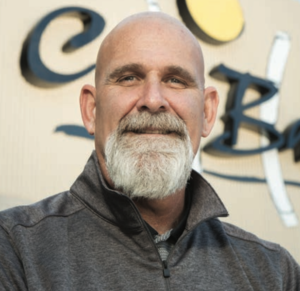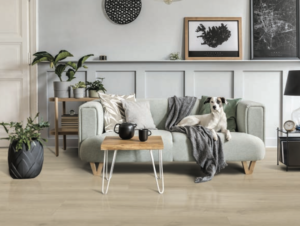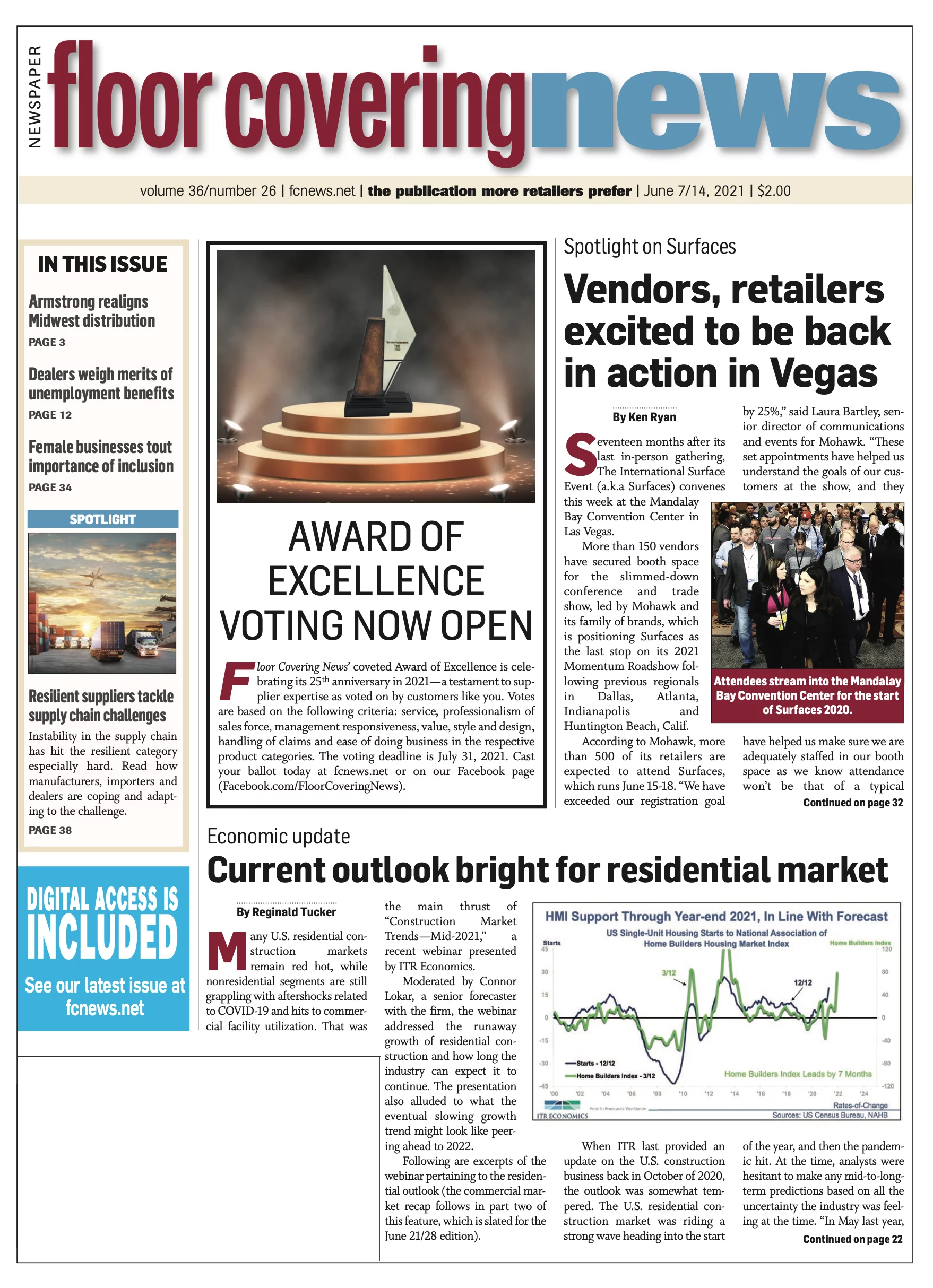
Laguna Beach, Calif.—One of the industry’s best success stories over the last four years is Cali, the company formerly known as Cali Bamboo. Under the leadership of former Shaw executive, Doug Jackson, Cali has entered other product categories, including the skyrocketing SPC segment. Not only has it grown its business from $9 million to $75 million at specialty retail, but it has also developed a strategy to circumvent many of the logistical issues plaguing other importers. Steven Feldman, FCNews publisher, recently caught up with Jackson to get the skinny on the company’s continued growth and more.
When you started at Cali, there was no specialty retail business to speak of, correct?
That is correct. When I made the move in 2017, we were Cali Bamboo with an eco-conscious consumer seeking the most sustainable flooring available. Our small specialty retail base supported us in this category, but we were limited to a select few who understood bamboo and appreciated the niche. The retail base was far from mainstream. So far that when I looked at our top 100 customer list, I was not familiar with a single customer. It was clear that we had a tremendous opportunity to develop and expand this channel as well as explore others. It was also clear that we would not accomplish this with just bamboo in our product portfolio.
And now specialty retail is in the tens of millions of dollars with total business pushing $200 million.
Yes. In just a few short years, we have redistributed our concentration in the home centers as well as cultivated new retail relationships—not to mention new product offerings to build a balanced business across multiple channels.
How have you gone from zero in specialty retail to probably close to $75 million dollars in such a short period of time?
We are very focused on a few things. No 1, we take a [focused] approach to product—a very limited product assortment with very limited distribution. No 2, we’re about relationships. Not only relationships with the consumer but relationships with our dealers. No 3, it’s about solving problems. We’re focused on what other people can’t and won’t do. And we try to find opportunities and holes in the marketplace where we can go in and create an option.
What’s the advantage of having limited SKUs?
Think of us as the “In and Out Burger” of floor covering. You go to a restaurant and see a million things, and people can’t be experts at everything. We have a very focused and deliberate SKU count, and we try to be unique yet relevant in our assortment as well as how we go to market. There is no point in developing a product category, a channel or a customer experience if we cannot distinguish ourselves—whether through our decors, our constructions or even our vibe (a.k.a. lifestyle). We are very thoughtful, not just in terms of SKU count, but at every touch point with our retail partners as well as the end user.
Limited SKUs allows you to have deeper inventory than others?
Yes, but I prefer to consider our SKU count as more [select] rather than limited. I can’t speak to others, but having limited SKUs allows us to have a very deep inventory, particularly in times like today when inventory is a bit of a struggle for some.
When it comes to colors, you are a little different than some others out there.
We like to think so. We’re one of the few companies that are styled on the West Coast. We take a coastal influence on not only our colors but our textures to make sure that both work together. We are styled with a designer in Southern California, but our coastal influence goes throughout the entire country. And when you see our color palette next to some of our competitors, you see the significant difference.
What are the biggest issues for you today as an importer?
We do have commitments in multiple countries in Asia, so we’re able to not be single source with one country in Asia. We have contractual agreements with container companies, so we have a commitment to containers coming across the ocean. And we have contractual agreements with domestic freight. Ideally, when you think about what we’re doing, it starts with design and style. So, when we go to the market, we own the raw material inventory. And then that raw material inventory can go to whatever factories we want to work with.
Let’s dissect each of those issues. You haven’t had an issue with securing containers to this point?
We have. Obviously, we have contractual agreements, but with our growth we’ve outrun those agreements. So, I would say a vast majority of our containers we’ve been able to secure, but some of them we’ve had a little harder time with.
How much more do you have to pay for a container today than a couple of years ago?
It’s gone up as much as three times.
Do you see that abating anytime soon?
It’s basic supply and demand. I think while we’re seeing so much demand, we’re going to see high prices until that levels off.
You talked about something called fast boats that you use. What are fast boats?
Express boats dedicated to move directly from Asia to California in a matter of days rather than weeks. Fast boats allow us choice of point of entry, which we can best navigate based on demand. The shortest distance between point A and point B is a straight line. The fast boats get that done for us.
Is the container size the same on a fast boat vs. a huge ship?
Container size is consistent. Number of containers are different.
You do business with the retailer as well as go direct to the consumer. You would think that is hurting your retailer customer, but it actually benefits them.

I think today and going forward, most consumers want to have a relationship with a manufacturer—whether it’s in floor covering or whatever you may be buying. But, clearly, a lot of folks are starting their shopping on the Internet. So getting that relationship with the consumer early in her journey—what we’ll call top of funnel—is good for the consumer, good for the industry and certainly good for our customers. Yes, we do sell direct, but we also have a robust business with the home centers and with specialty retail. With a very limited distribution that we go out to market, and a limited number of SKUs, we allow our partners to make great margins. There are a few brands out there that have a direct-to-consumer business and a robust retail business. And those brands, like Lego and Apple, have earned the right to say, “You can still make money on our brand, and we can still have a relationship with the consumer.”
By going direct to the consumer, there are significant margin dollars for the company, which then allows the retailer to make a little more money because you don’t have to make that same margin. Is that fair?
That’s very fair. We only sell off one label, we don’t private label, we don’t white label. So, there’s one label, one name, one price at the MSRP. Cali MAP pricing policy establishes a set price in the marketplace, and that allows retailers to make fantastic margins on our products. It eliminates the all-too-familiar consumer “hunt up and down the street for the lowest price goose chase.
Can it be argued that the direct channel allows you to experiment with something? And if it works, you can take that experiment into specialty retail?
One hundred percent. Any time you have that direct relationship with the end user, and you talk to as many end users as we do daily, you really get a chance to understand the pulse of the marketplace. So, when we aren’t quite sure about something or we want to stick our toe in the water, what a great way to test it first—whether it’s a product, a product category, a color, a thought process—and get instant feedback. Then we make sure we get that refined before we take it to specialty retail. So, we’re bringing you a product we know is the right color. It has a proven track record of success.
You talked about being in the home center. You would think that would be a competitive disadvantage for a retailer but, in reality, it could benefit them because the home center is actually advertising the Cali brand.
We would like to think the strategy to have only one name, one label and that same name and that same label is found online at home center or at retail. And that the prices were set with MAP pricing that would help the retailer. That would allow somebody to get consistency of knowing where their margins are going to be. What every retailer wants is a product they could show, specify and hold a sale and make good margins.
I always ask NFA members to give me a few suppliers that are going above and beyond. They always mention Cali. Why?
We’re still a relatively small industry, and I think the industry is about relationships. I think it’s about putting us in a position where you understand other people’s businesses. And early on, Bob Fish, who’s our VP of specialty retail sales, visited every NFA member personally because he wanted to understand their individual businesses. We don’t sell everybody up and down Main Street. We have a very limited distribution, and when they run into Cali, typically it’s in a place where they can hold their margins and hold their sales. And that’s what every retailer wants to do.
I remember talking to you three, four years ago, and I asked you how many customers you had. You told me it was too many.
I told you I still want to sell friends and family. We really want to have a relationship with our retailers. We always get asked by people if they can carry the Cali line and we politely turn them down. We want to know somebody; we want to know their business; we want to understand how they go to market; and then we want to know that we can be an asset to them and not just another display in their showroom.
What have been the home run products for you over the last year?
I grew up in Southern California—I still surf a lot—and I decided we were going to put a surfboard on a display and put it in flooring stores. Many laughed at the idea. Regardless, we introduced our Longboards display featuring a classic longboard surfboard. It is no secret that our Longboards collection is breaking all the rules as well as breaking sales records. Why? Because it is not just another LVT product. It is a style and one that speaks to the entirety of the Cali brand, the Cali lifestyle.
Compare the first four months of 2021 to the first four months of 2020.
Because of our direct relationship with the consumer, our first four months of 2020 remained strong. When everything closed down, we were still doing really well because people were at home and on the Internet shopping for flooring. They were finding us, and we were open. And because we had so much inventory and relationships with the right retailers, we had the right stocking positions for those that were still open. We really had them in a good inventory position. Remember, we’re deeper with certain products. Our 2020 was very strong, so going into 2021 we’re significantly ahead of 2020, but we think it’s really more about market share we’re gaining than it is anything else.
Where do you feel you’re taking market share from?
I think we’re taking share from companies that may be compromised from an inventory standpoint. Also, in a sea of sameness, we could be considered a fresh new option.
What’s the next innovation in SPC?
The waterproof attribute remains important with the consumer, so we will look for opportunities and innovation in cores, click systems and wear layers. Additionally, we are pursuing the expansion and application of digital print, both in traditional applications as well as on new substrates. We will continue to ask ourselves, “What are we solving for?” and then look to innovations to find solutions—whether it is in SPC or other core materials.

